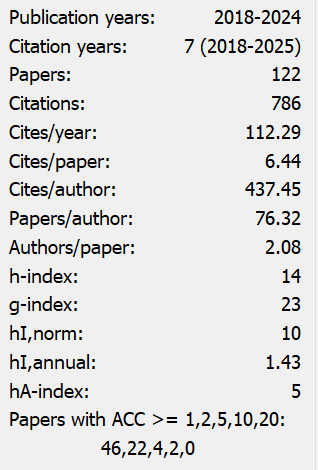Government Subsidies Affect the Competitiveness of Game Listed Companies
Abstract
The game industry, as an important carrier of the digital economy and the dissemination of traditional culture, has attracted much policy attention in its development. Based on the existing literature and research, we find that government subsidies and game enterprises' R&D investment are important factors affecting the sustainable development and competitiveness of game enterprises. In order to better study how to enhance the competitiveness of game enterprises themselves to form a benign competition and propel the game industry's explosive growth, this paper takes 31 listed game companies as samples to conduct relevant empirical tests and bootstrap tests. Research shows that: (1) Government subsidies significantly enhance the competitiveness of enterprises. (2) R&D investment plays a partial mediating role between the two (with an mediating effect proportion of 19.86%), indicating that subsidies indirectly enhance competitiveness by stimulating R&D, but they are not the dominant path. Based on this, we have put forward some policy suggestions, such as continuing and strengthening the subsidy policy, optimizing the subsidy management mechanism and establishing a dynamic management model of "performance tracking + R&D subsidies", as well as differentiating the positioning of subsidy recipients.
References
Betchoo, N. K., & Katembo, D. K. (2024). Enterprise Competitiveness Calculation Modelling. Texila Journal. https://www.texilajournal.com/management/article/2655-enterprise-competitiveness-calculation
Policy Document Beijing Economic Technological Development Area. (2020). Beijing Economic Technological Development Area Game Industry Policy. beijing.gov.cn. https://kfqgw.beijing.gov.cn/zwgkkfq/2024zcwj/202404/t20240424_3635039.html
Beijing Municipal Press and Publication Bureau. (2021). Announcement of the list of projects supported by the Beijing Cultural Industry Guidance Fund. http://whj.beijing.gov.cn/zwgk/tzgg/202102/t20210208_2250142.html
China Daily. (2025). Shijingshan District has issued policies to support the high-quality development of the gaming and e-sports industry. Sohu.com. https://www.sohu.com/a/877861760_121955537
China Game Industry Report 2015: Revenue 140.7 billion yuan, 530 million players. (2015). Huanqiu. https://game.huanqiu.com/article/9CaKrnJSo6j
Ding, P. (2022). Research on the impact of government subsidies on the competitiveness of listed game companies [Master's thesis, East China University of Political Science and Law]. CNKI. https://link.cnki.net/doi/10.27150/d.cnki.ghdzc.2022.000753
Forward-looking Industry Research Institute. (2024). Big news! Summary and Interpretation of China's Mobile Game Industry Policies in 2024 (Full) Encouraging High-quality Games to "go global". Tencent. https://news.qq.com/rain/a/20240314A085F000
Guangzhou Huangpu District Press and Publication Bureau. (2023). Several Measures of Guangzhou Development Zone (Huangpu District) to Promote the High-Quality Development of the Game and e-sports Industry. https://www.gz.gov.cn/gfxwj/qjgfxwj/hpq/qbm/content/post_9583739.html
Han, H. Y. (2022). Research on the impact of government subsidies and tax preferences on the operating performance of cultural and media enterprises in China [Master's thesis, Lanzhou University of Finance and Economics]. CNKI. https://link.cnki.net/doi/10.27732/d.cnki.gnzsx.2022.000431
Jia, L., Nam, E., & Chun, D. (2021). Impact of Chinese government subsidies on Enterprise Innovation: Based on a three-dimensional perspective. MDPI. https://www.mdpi.com/2071-1050/13/3/1288
Li, Y., Ye, W., & Wang, Z. (2013). The R&D funding effect of the government on enterprises: Complementary or crowding-out - An empirical study on large and medium-sized industrial enterprises in Shanghai. Research on Science and Technology Management, (5), 62-66.
Liu, H., & Teng, H. (2020). The threshold effect of R&D investment based on life cycle on enterprise value. Science Research Management, 41(1), 193-201.
Liu, X. (2019). The impact of R&D investment on enterprise competitiveness. Special Zone Practice and Theory, (3), 43-51.
Liu, Z. (2024). Research on the impact of government R&D subsidies on enterprise R&D investment [Master's thesis, Northwest A&F University]. CNKI. https://link.cnki.net/doi/10.27409/d.cnki.gxbnu.2024.000252
Sohu. (2024). The subsidy policy for the game industry in Chengdu High-tech Zone has helped major companies rise, with well-known enterprises such as Xishanju and Ubisoft taking the lead in making their moves. Sohu.com. https://www.sohu.com/a/835212470_122004016
Project Team. (2025). Annual development overview of China's game industry - Based on the data from the "2024 China Game Industry Report". Digital Publishing in China, 3(1), 61-66.
Wang, J. (2025). Shijingshan has issued policies to support the development of the game and e-sports industry, offering a maximum subsidy of 10 million yuan for research and development. The Beijing News. https://www.bjnews.com.cn/detail/1743419140129984.html
Xiamen G-Bits Network Technology Co., Ltd. (2024). Communication meeting minutes. https://sns.sseinfo.com/resources/images/upload/202405/20240506173203634945354.pdf
Zhang, M. (2022). Research on the impact of government subsidies and R&D investment on enterprise competitiveness [Master's thesis, Beijing Institute of Fashion Technology]. CNKI. https://link.cnki.net/doi/10.26932/d.cnki.gbjfc.2022.000127
Zhang, N. (2016). Research on the impact of government subsidies on the competitiveness of leading agricultural enterprises [Master's thesis, Shihezi University]. CNKI. https://kns.cnki.net/kcms2/article/abstract?v=-Y4qPNLDuvYSbpvlcHDk8WLtfyS4TftSKzJLogjwfCT0JsA3j60fD4LrCyr2zmYBLXEyyp7YN0RZgeHVYGXkFeELJweUBFVxo5TWOrxZSU668zT6dQoL6ZTt5YkdzbQejXe2o8Nq717yVvQv2lmkULmpoJX5J5rAQfljABwRFmHdejcDPIheaHD3R2wSRETRLjjlNUZLQxc=&uniplatform=NZKPT&language=CHS
Zhou, W. (2022). Research on the impact of government subsidies on the competitiveness of listed companies in the automotive manufacturing industry [Master's thesis, Xiamen University]. CNKI. https://link.cnki.net/doi/10.27424/d.cnki.gxmdu.2022.005207
Zhu, Y. (2017). Research on innovation element input and enterprise competitiveness: An empirical test based on China's manufacturing listed companies. Productivity Research, (3), 134-139.
Zuo, Z., & Lin, Z. (2022). Government R&D subsidies and firm innovation performance: The moderating role of accounting information quality. Journal of Innovation & Knowledge, 7(2), 100176. https://doi.org/10.1016/j.jik.2022.100176

This work is licensed under a Creative Commons Attribution 4.0 International License.
Copyright for this article is retained by the author(s), with first publication rights granted to the journal.
This is an open-access article distributed under the terms and conditions of the Creative Commons Attribution license (http://creativecommons.org/licenses/by/4.0/).


























